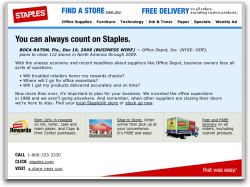
Just over a month ago, on December 10, Office Depot announced that they were closing several stores. Hardly the first to succumb a worsening market, Office Depot joined OfficeMax in announcing cuts that will leave additional workers looking for jobs.
The ink had barely dried on Office Depot's announcement when the dinging of my mail program played the new mail sound. There was the email from Staples asking "Will Office Depot closings affect you?" My initial thought was that this was a little bit of a cheap shot but would likely have some useful information. Instead upon opening the email it turned out that Staples was purely spreading fear, uncertainty and doubt. Far from offering solutions and providing information on how Staples might help, the email instead was designed to play on fears that Office Depot's troubles will cause my business to have problems.
So this was all annoying enough. But then we come to see how our taxpayer dollars are being used in the bailout. Recently General Motors, which already got more than $13 billion in taxpayer assistance, and says they need more. So what is this money doing? Is it going to make the vehicles safer, or to keep more Americans working?
Well if the ads tell us anything GM is more concerned about trying to reduce those working at Ford, Dodge and American Toyota plants than anything else. Ford has new features to make their trucks easier to use. Chevy has ads making fun of people using Ford trucks. Dodge has comfort features in their trucks. Chevy has ads making fun of people driving Dodge trucks. Toyota has trucks that are comfortable and have developed a reputation for being great and, you guessed it, Chevy has ads making fun of Toyota truck drivers.
I guess it is understandable. Most of the life-long Chevy truck drivers I've known now drive Toyota trucks. At least Chevy is keeping ad agencies in business with their negative ads. One is left to wonder what's next? With the decades of bailouts that have already gone WalMart's way can we expect an ad campaign about how "bad" buying local is?